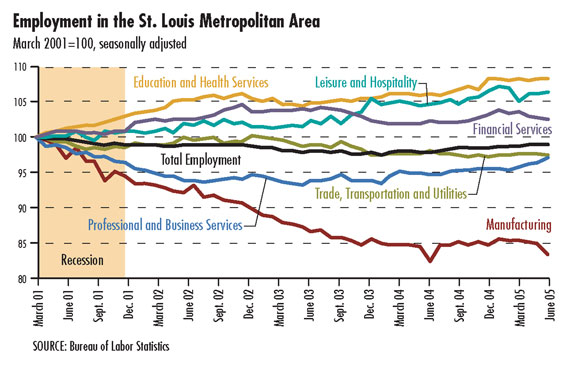District Overview: District's Largest Urban Area Slowly Regains Jobs Lost during Recession
Although the most recent U.S. recession officially lasted from March to November 2001, employment in the St. Louis metropolitan area continued to fall through much of 2002 and 2003. According to the payroll survey conducted by the Bureau of Labor Statistics, St. Louis' total nonfarm employment declined by more than 32,000 or nearly 2.5 percent between March 2001 and December 2003. Following a period of relative stability in the first half of 2004, St. Louis' labor market subsequently expanded. During the latter half of 2004, the metropolitan area gained 9,000 jobs. Positive employment growth continued into this year; between January and July, St. Louis gained another 6,000 jobs.
Gainers and Losers
Despite the net drop in total employment since March 2001, two sectors in St. Louis have registered sizable employment gains over the past four years: education and health services, and leisure and hospitality. Since March 2001, employment in the education and health services sector has increased by 8 percent or slightly more than 15,000 jobs. This pattern followed the national trend in which education and health services employment increased by more than 12 percent over the same period. Between March 2001 and July 2005, St. Louis' leisure and hospitality sector experienced employment growth of over 6 percent or nearly 8,500 jobs. This increase owes primarily to growth in the accommodation and food service industry, as hotels, motels, and eating and drinking establishments added over 6,500 jobs.

Employment has also grown within St. Louis' relatively smaller financial services industry, which includes banks, security brokers and insurers, as well as jobs in real estate. Since March 2001, nearly 2,000 financial services jobs have been added to the metropolitan area's payrolls.
Underlying much of St. Louis' net job loss since March 2001 are losses in three major sectors: manufacturing; professional and business services; and trade, transportation and utilities. Manufacturing, by far, has experienced the deepest job losses in the metropolitan area over the past four years. Collectively, St. Louis manufacturers eliminated more than 25,000 jobs or roughly 15 percent of their payrolls between March 2001 and July 2005. Nationwide, manufacturing employment declined by more than 15.5 percent over the same period.
Although not as large, job losses in the professional and business services sector numbered approximately 6,000 over this period. Trade, transportation and utilities lost an additional 6,500 jobs due primarily to declines in transportation and utilities rather than wholesale and retail trade.
Reversing Roles
During the first half of this year, the primary job growers of the past four years have begun to slow. Payrolls in both leisure and hospitality and education and health services have been relatively flat since the beginning of the year.
Two of the major job losers since March 2001, by contrast, have begun to show some new life. Since January 2005, the professional and business services sector has recovered, gaining more than 4,000 jobs in the past 12 months, 3,000 of which have been added since January. Modest gains have also been seen in trade, transportation and utilities, although much of this is associated with stabilization in the transportation sector combined with gradually expanding employment in wholesale and retail trade. ore than 400 jobs have been added in the trade, transportation and utilities sector since January.
Recovering Slowly
Recent trends indicate that employment in St. Louis appears to have turned a corner. Although still 14,000 jobs short of its March 2001 peak level, St. Louis has nonetheless shown steady job growth for much of the past year. In the past six months, most major sectors have either stabilized or begun to expand. All of this points to a labor market that is slowly, but gradually, strengthening.
Views expressed in Regional Economist are not necessarily those of the St. Louis Fed or Federal Reserve System.
For the latest insights from our economists and other St. Louis Fed experts, visit On the Economy and subscribe.
Email Us

